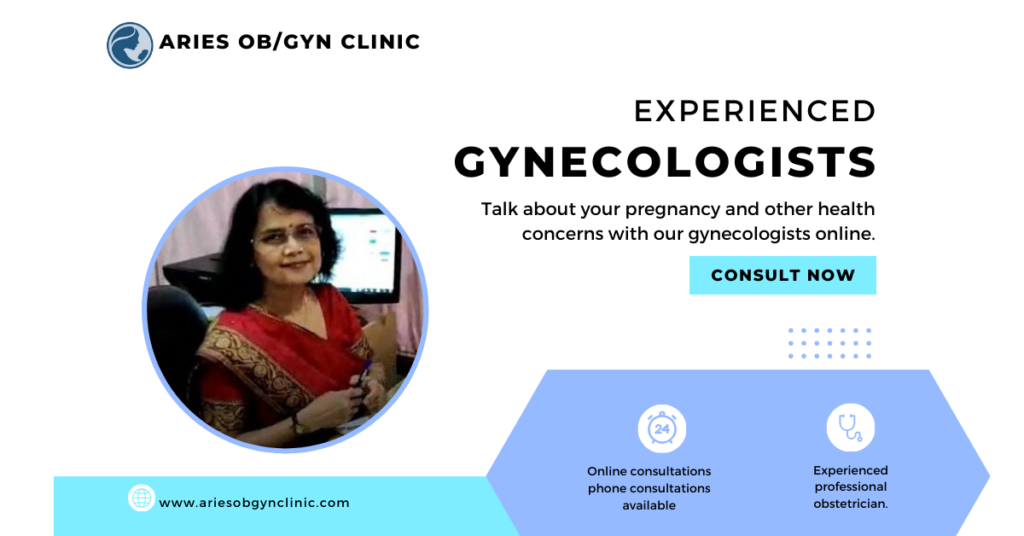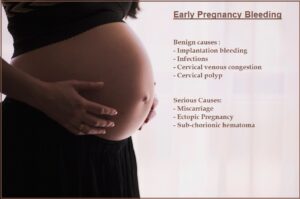The first trimester of pregnancy starts from the first day of your last period to the last day of the thirteenth week of pregnancy. It is a very crucial period of pregnancy. All of the major fetal organs will have grown by the conclusion of this trimester, and the fetus will start to resemble a human being.
What is the First Trimester of Pregnancy?
As the fetus grows and develops, the body undergoes several changes. A typical pregnancy lasts for 40 weeks, or 280 days. It is broken up into three phases termed trimesters, each of which lasts for around 13 weeks.All three trimesters share a lot of characteristics, but each trimester also has unique indications and symptoms.
What does the First Trimester include?
Since the first trimester begins from the first day of the last period, it includes ovulation and fertilization within its days.
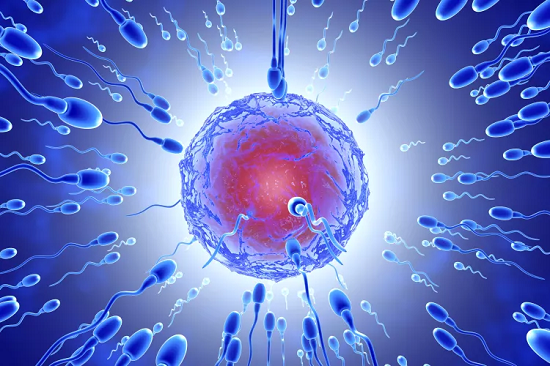
What are the symptoms of the first trimester of pregnancy?
Missed Period
A missed period is usually the first sign of pregnancy.
Since pregnancy starts from the first day of the last period, a woman is already 4 weeks pregnant by the time she misses her period.
Sometimes, a pregnancy can occur without previous regular periods – for example, in breastfeeding mothers, perimenopausal women or women with irregular periods , especially in conditions like PCOS.
Some women may have a slight bleeding at the time of the missed period due to implantation bleeding. Implantation bleeding may be mistaken for a regular period.
But, implantation bleeding is typically very minimal – it may only be a brownish or pinkish discharge, far less than the usual menstrual flow. Sometimes, it may be only a single drop of blood.
Nausea with or without vomiting
Many pregnant women have morning sickness, often known as pregnancy sickness, in the early stages of their pregnancies.
Morning sickness occurs due to increasing HCG levels ( Human Chorionic Gonadotrophin), secreted by the corpus luteum in the ovary. Morning sickness with nausea and vomiting increases gradually and peaks around 8-9 weeks. Then it gradually decreases and becomes minimal by the start of the second trimester.
But for some women, nausea and vomiting may persist right up to the final month of pregnancy. This is especially true if there is also heartburn and acid reflux, as acidity increases the symptoms of morning sickness.
Antacids can reduce the intensity of morning sickness by reducing gastric acidity.
While the nausea and vomiting can be controlled to some extent by medicines, morning sickness cannot be totally cured.
First-time mothers are more likely to experience morning sickness.
Morning sickness is generally manageable with medicines. But in a condition known as Hyperemesis gravidarum, the vomiting may be so severe that it can interfere with regular health. The pregnant women may then need to be hospitalized to get supportive care.
Sore Breasts
One of the early indicators of pregnancy in many women, even before the first missing period, may be aching breasts.
The high progesterone levels required to support pregnancy causes the breasts to expand and enlarge, preparing them for lactation. The nipples grow quite fast and become very sensitive to touch.
The nipples and areola may also become darker due to pigmentation and fine veins may appear on the breasts.
Wearing a seamless, soft cotton bra that doesn’t irritate the nipples can help to reduce breast soreness to some extent The discomfort brought on by sore breasts can also be lessened by using a sports bra that keeps the breasts securely in place and restricts mobility.
Despite the fact that breast growth continues throughout pregnancy, the body adapts to the expansion, and in the second trimester, there may be decrease in breast soreness.
Excessive Fatigue in Pregnancy
A common symptom of early pregnancy is extreme tiredness. The high level of progesterone decreases metabolism and makes the body sluggish – this slows the digestion as a whole and decreases absorption of food from the intestines.
Loss of appetite and dehydration as a result of nausea and vomiting may cause decreased nutrition. This is especially so if the diet is not supplemeted by vitamins and minerals.
Lack of adequate sleep at night in the first trimester can make you may feel more drowsy and exhausted throughout the day. Indigestion and heartburn, leg cramps, more frequent urination, and stressing over pregnancy and childbirth can also be factors for loss of sleep.
Increased frequency of passing urine
You may feel an increased need to pass urine in the first trimester. This is due to pressure by the growing uterus on the bladder reducing bladder capacity. It is also due to the increased blood volume during this time and the increased blood flowing through the kidneys.
Increased Vaginal Discharge
Many women complain of excessive vaginal discharge in early pregnancy. The discharge is usually thin, white or clear. This discharge comes from cervical glands stimulated by progesterone. Like the other parts of the reproductive tract, the cervix too is stimulated by the hormones of pregnancy.
You shouldn’t be concerned as long as the vaginal discharge doesn’t smell, doesn’t itch or burn, and isn’t brownish in color (brown color may indicate blood in the discharge).
Increased Salivation in Pregnancy
A lot of pregnant women complain that one of the most irritating symptoms they have is excessive salivation. They have to spit constantly throughout the day. But since the mouth fills practically immediately, spitting is ineffective. Some women may even drool at night.
Headaches in Pregnancy
Some women, especially in the beginning of pregnancy, may experience chronic headaches on a regular basis. Headaches in pregnancy can be due to dehydration, increased blood volume or stress.Or it can be due to a flare up of a previous migraine.
Weight gain
Weight gain is minimal in the first trimester – maximum weight gain may be 1-2 kgs or less. Most of this weight gain is in uterus, the placenta, the breasts, and the extra blood volume during this time. Fetal weight gain is very low.
Growth of the Uterus
The uterus is not palpable through the abdominal wall during the first trimester. It continues to be a pelvic organ through the 12th week, that is, it stays inside the pelvic bone cavity and cannot be felt through the abdominal muscles.
The enlargement of the uterus can be felt only by a pelvic examination. It is around the size of a tiny plum at 6 weeks, an orange at 8 weeks, and a newborn baby’s head at 12 weeks.
Regular, gentle contractions and relaxations of the uterus, often known as a Braxton Hicks contraction can also be felt at this time.
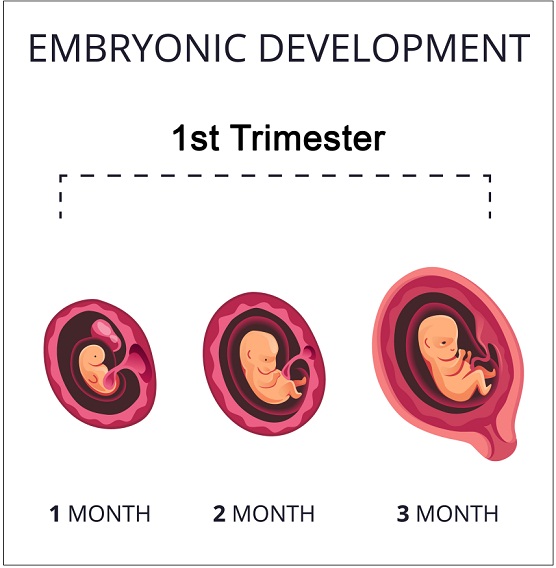
Milestones by the end of the First Trimester:
- The major organs and structures of the baby have formed.
- Around week 5, the tube that will develop your baby’s heart will start to beat. And at 12 weeks, the heart beats regularly at 120 – 160 beats per minute.
- Fingers and toes have formed and are distinguishable in an ultrasound.
- The fetus is around 3 inches (in) long and weighs nearly 1 ounce.
- The fetus is active and swims freely in the amniotic fluid.
- Optic nerves and lenses will begin to form by week 4. And the end of the first trimester, the eyes, the nose ridge and the mouth cavity is formed.
- Your baby’s arms, legs, hands and feet will begin to form around week 6. Their tiny fingers and toes will start growing around week 10. It can flex and extend its legs and make a fist.
- Your baby’s skin will begin forming between weeks 5 and 8. By the end of the first trimester, the hair follicles and nail beds begin to form.
Frequently asked Questions:
How can I take care of myself in the first trimester?
The first trimester is a very important stage of pregnancy. You have to keep healthy for a healthy pregnancy. Remember to take a good nourishing diet and adequate water. This will help meet your baby’s nutritional needs, as well as your own. Fresh fruits and vegetables are necessary. Protein is needed for the growth of the baby.
If you cannot eat well because of the nausea and vomiting, please ask your doctor for medicines to control the vomiting and the acidity – acidity can contribute to nausea.
Do slow stretching exercises. Very active exercises which needs running, jumping or lifting weights is best avoided. Walking is the best exercise.
Get adequate sleep and rest – at least 7-8 hours at night and a 2 hours daytime nap.
What should I avoid during the first trimester?
Avoid anything that puts too much stress on the body. Jumping , running and lifting weights should be avoided. Do not eat any food which is too spicy or hot.
Avoid alcohol at any time. Even a small amount of alcohol can increase the risks of getting Fetal Alcohol Syndrome (FAS).
Stop smoking. Ask your partner to stop smoking to avoid second-hand smoke.
Coffee should be limited to 1 cup per day.
What supplements do I need to take?
Most prenatal vitamins contain adequate supplements. Folic acid and iodine supplements are recommended, as it’s difficult to get enough of these key nutrients from food alone.
Can I exercise?
Light stretching exercises are good to take. Pregnancy yoga is quite safe. Walking is the best exercise and walking for 30 minutes either continuously or in phases of 10 minutes for 3 sessions is best. Walking is considered a safe activity during pregnancy because it works your cardiovascular system without taxing your muscles and joints
How to know if I have a problem in the first trimester?
You will know that something is not right if you have:
Bleeding: while light bleeding can be due to implantation bleeding or from congested veins in the cervix, it could also be due to a miscarriage or ectopic pregnancy. Consult your doctor as early as possible for an ultrasound.
Pain: Some amount of light pain or cramps can occur in early pregnancy as the uterus enlarges. But pain which increases gradually and does not subside when you rest may be serious and you need to see a doctor.
Severe Vomiting: A condition called hyperemesis gravidarum can cause severe vomiting . If you are unable to keep any food or liquids down for more than 48 hours, please consult your doctor.
When do pregnancy cravings start?
Pregnancy cravings can start as early as the fifth week in the first trimester. But it is more common to get them in the second trimester up to the end of the third trimester.
Can I travel during pregnancy?
Since the risk of miscarriage is higher in the first trimester, it is better to avoid travelling unless absolutely necessary. Especially road travel where the roads may be bumpy.
Can I have sex?
Sex is safe in the first trimester as long as it is not rough and as gentle as possible. Place a pillow on your abdomen for protection.
Can I climb stairs in the first trimester?
It is fine to climb stairs during pregnancy but you need to be careful while doing so. Hold the railing of the stairs tightly and take slow steps while using the stairs. Make sure your footwear and the staircase are not slippery.
Read Questions and Answers on Pregnancy and Gynecology

How to stop my Period…
How can I stop or delay my period? Can I use birth control pills?
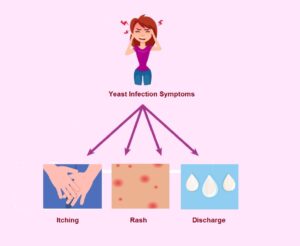
I think I have a yeast infection
I think I have a yeast infection. I had vaginal itching earlier and it is itching again now. What should i do?

I think I have Bacterial Vaginosis
I think I have bacterial vaginosis. I have a vaginal discharge with a fishy odor since the last few days. When should I see a doctor?
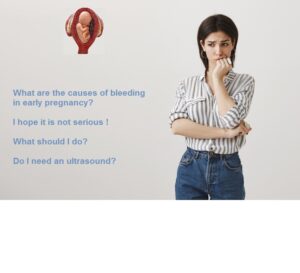
I am in early pregnancy and have dark brown discharge
Early pregnancy bleeding. What is wrong with me? What should I do?

I am in Menopause and Bleeding Heavily
I am 52 years old and in menopause. I have been bleeding heavily for 8 days. What should I do now?

Missed birth control pill. Will I get pregnant?
I missed a birth control pill on the second week. Then I took the next one on time. I also took the placebo pills I day early. Will I get pregnant?

